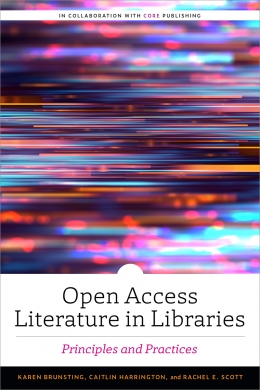Primary tabs
You don't need to be an ALA Member to purchase from the ALA Store, but you'll be asked to create an online account/profile during the checkout to proceed. This Web Account is for both Members and non-Members.
If you are Tax-Exempt, please verify that your account is currently set up as exempt before placing your order, as our new fulfillment center will need current documentation. Learn how to verify here.
- Description
- Table of Contents
- About the authors
- Reviews
Read an interview with the authors now!
Opening libraries to the exciting possibilities of Open Access, this book outlines both its strategic and practical aspects, showing librarians how to understand and support OA regardless of their organizational context or resources.
Open Access has evolved into the most complex challenge of the scholarly publishing landscape and something libraries grapple with on a regular basis. But although librarians hold increasingly positive perceptions about OA, including its richness of unique content and immediacy of access, many lack the understanding, training, documentation, and knowledge of best practices that would allow them to engage with it confidently. This book helps to fill that gap, using a holistic approach that walks readers through the steps of integrating OA resources into library collections and supporting OA initiatives irrespective of budget, institution type, collection size, and staffing. Explaining definitions and models of OA, types of OA support, the tensions between free-to-read and libre OA, and other key topics, from this book readers will learn
- the origins and growth of OA, how to define it, and some of the ways in which librarians have made connections to OA;
- where OA diverges from the historic role of library collection development policies and ways to bring OA into alignment with an institution's collection development principles and practices;
- real-world examples of how libraries have supported or integrated OA into their collections, including strategies for selecting and activating OA titles and collections for inclusion, offering open educational resources (OER) to students, samples of collection management workflows, and ideas for aligning collections with institutional repositories or other Green OA initiatives;
- guidance on financially supporting OA content, initiatives, and platforms;
- how OA publishing does and does not harmonize with diversity, equity, and inclusion initiatives; and
- tips for using ongoing assessment and evaluation to continuously support the library’s path to an open future.
Preface: Why We Could Not Write a Book on Open Access Policies
Acknowledgments
Introduction: Open Access in Library Collections
Chapter 1: Collection Development Policies and Open Access
Chapter 2: Open Access and Library Collections: Current Practices
Chapter 3: Open Access Principles
Chapter 4: Open Access Practices
Chapter 5: Diversity, Equity, and Inclusion in Open Access Publishing
Chapter 6: Responding with Agility to Open Access Change
Conclusion: Let This End Be Your Beginning
Appendix: Recommended Reading
About the Authors
Index
Karen Brunsting
Karen Brunsting is the acquisitions and collection development librarian at the University Libraries, University of Memphis. She is also the librarian for the Memphis Brooks Museum of Art. She holds a BFA from the School of the Art Institute of Chicago; an MLIS from the University of Tennessee, School of Information Sciences; and an MBA from Christian Brothers University. Her current research includes collection development practices and open access literature.
Caitlin Harrington
Caitlin Harrington is the head of information access services and the electronic resources librarian at the University Libraries, University of Memphis. She has master’s degrees in library and information science and instructional design and technology. Her research interests include open access publishing, information privilege, and open educational resources.
Rachel E. Scott
Rachel E. Scott is the associate dean for information assets at Illinois State University’s Milner Library, where she oversees the library’s access and technical services, collection development, scholarly communication initiatives, and cultural heritage activities. Scott recently completed a PhD in historical musicology and conducts research at the intersections of information literacy, library collections and their discovery, music bibliography, and scholarly communication.
Core
The former Association for Library Collections and Technical Services (ALCTS), the Library Information Technology Association (LITA), and the Library Leadership and Management Association (LLAMA) are now Core: Leadership, Infrastructure, Futures, a new division of ALA. Its mission is to cultivate and amplify the collective expertise of library workers in core functions through community building, advocacy, and learning.
"This refreshing and well-edited book makes a convincing argument for reluctant libraries to become active players in OA and for engaged libraries to reaffirm and enhance their support and advocacy ... I encourage this afternoon read for anyone looking for a broad overview of the OA landscape or ideas for entry points to incorporating OA into collections work. More broadly, administrators interested in fostering agility in their organization will find meaningful examples of institutions using principles over policies. Bring a highlighter!”
— Technicalities
"This work removes a lot of the mystery of OA and its issues. Their detailed instruction tells of various OA funding initiatives and processes, which can be institutional game changers. They describe OA implementation steps at the consortia, system, collection, and title levels. This work should be on the shelf of collection development, e-resources, cataloging, interlibrary loan, and library administration staff.”
— Journal of Hospital Librarianship
"Solid, research-based analysis of OA theory and principles to guide research organizations and practitioners.”
— Journal of Australian Library and Information Association
"The book provides a useful blend of practical advice and philosophical principle, so it can act as both a primer for librarians new to OA and a quick reference for those already actively engaged in OA practices. A solid addition to the literature on a burgeoning area of information science.”
— Choice



